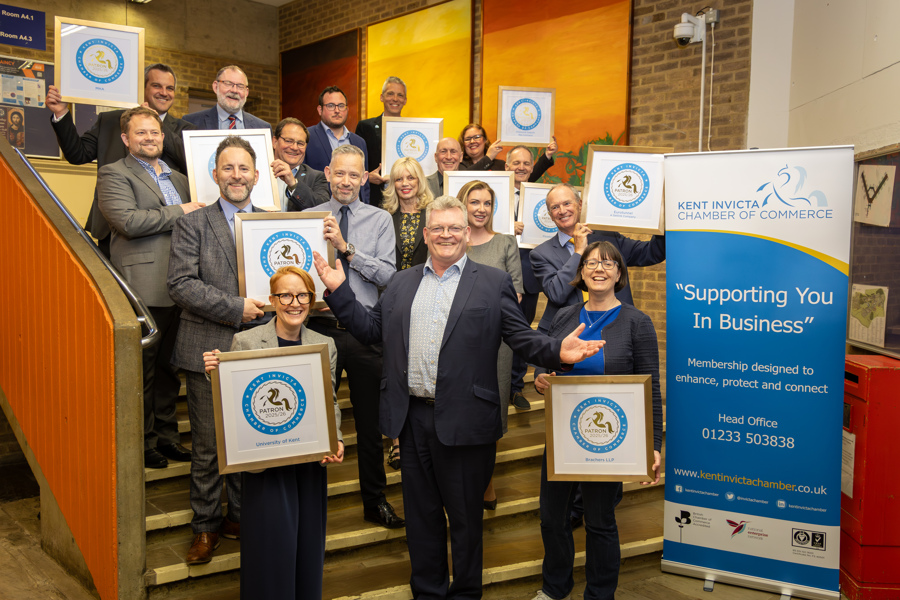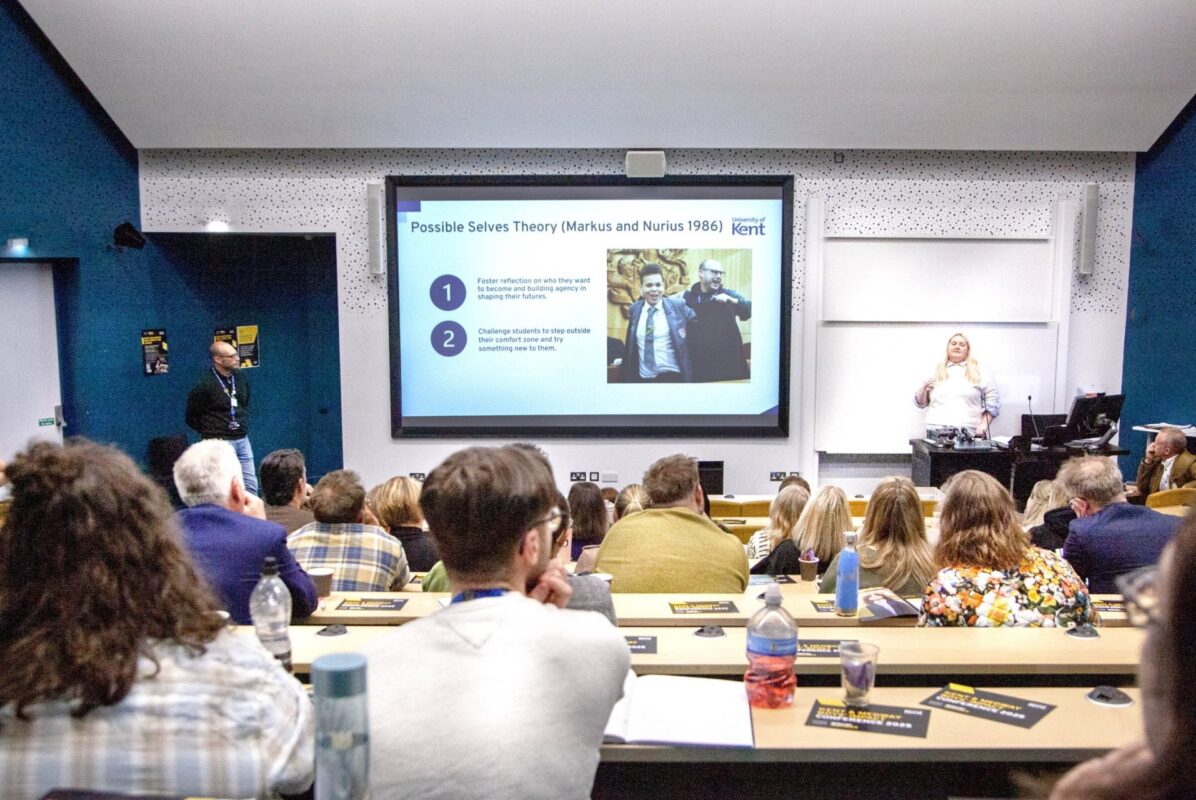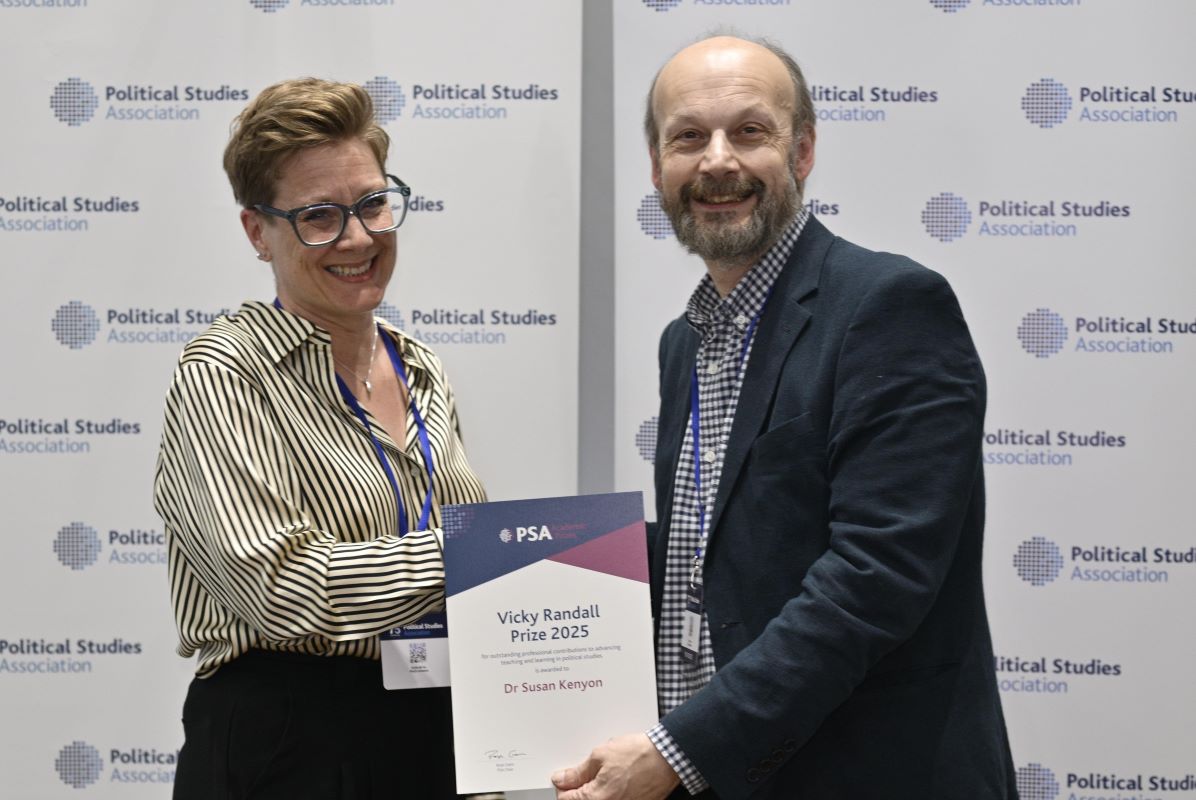Kent’s Economist Degree Apprenticeship first graduates

The first cohort of Professional Economist Degree apprentices at the University of Kent completed their four-year journey in a graduation ceremony at Canterbury Cathedral at the end of 2023 and are all now in full-time employment.
The cohort graduated with a fee-free economics degree, during which they benefitted from a salaried role in a government department, meaningful work with opportunities across the UK and permanent roles on successful completion. Guaranteed a job with their employer if they achieved a 2:1 or above, there was a 100% employment rate amongst the cohort, demonstrating the power of work-based learning.
Many have already received promotions and continue to produce great work for their employers which include the Bank of England, Arup, Jacobs, Ofcom, Northamptonshire County Council and the Civil Aviation Authority. Others have gained exciting new jobs and a number have now decided to undertake a Masters level apprenticeship.
The successful degree apprenticeship programme (DAP) attracts applications from people who may not consider going to university or even a career in economics. This helps the profession to bridge the known diversity gap in economics, and organisations can gain much from their life experience and contribution.
Awarded runner up in the Widening Access and Outreach category of the 2020 Guardian University Award, the degree apprenticeship combines rigorous academic study complemented with extensive work experience. This route to higher education is particularly attractive to Muslim students who are unable to take out student loans, as engagement with interest is haram (forbidden).
‘I have friends on either side of the spectrum. Some that took up the loan without realising the Islamic perspective and some that decided to not go ahead and go straight into working. There are some that took years out to save up and fund parts of their degree.’ current Kent DAP student Nihad Attab told us, ‘It was a big achievement in my family as unfortunately my older siblings had not been aware of apprenticeships so had to take out student finance.’ Nihad is part of the Economist Muslim Apprenticeship Network (EMAN) and is her second year, apprenticed at Oxford Economics.
All of the employers of Kent’s first Professional Economist Degree cohort provided robust, supportive and exceptional early careers route into becoming an economist. Alongside the employers, the apprentices benefited from dedicated support offered by the University through expert academics and apprenticeship advisors. Several Kent apprentices saw their work presented at the highest level in their organisations, including in commercial bank boardrooms and even in Number 10 Downing Street.
Some of the best work of the recent graduates has been published in the Kent Economics Degree Apprentice Research Journal : Issue 1, 2023.
Professor Alastair Bailey, of Kent’s School of Economics and part of the team who developed the programme is delighted with the achievements. He said: ‘This success is something which I’m determined to expand. We receive applications from many thousands of hopeful and well qualified candidate apprentices, but expansion is limited by workplace opportunities. Our task now is to persuade new employers of economists, and across a wider range of sectors, that they too can gain by giving opportunities to new Professional Economist apprentices.
Because most, or all, of the tuition fees are covered by the Levy, the cost to their organisation comprises just the apprentices’ salary and a day a week in study time. Yet the benefits employers can expect, counted in terms of additional work output and a real investment in the future staff base, are large indeed. Who can get involved? Any organisation, company, charity or public body. In fact any institution which employs economists who perform any form of economic analysis as part of, or support of, their daily functions stand to gain from offering a place for a Professional Economist Degree Apprentice.’
The external examiner for the degree provided exceptional feedback, stating:
‘This entire programme is an example of good practice. The clear partnership between Kent and the employers provides synergies that allows students to develop deeper understanding and provides a much greater motivation for students than exists in many other, non-apprenticeship programmes across the country.’
The degree apprenticeship follows academic content that mirrors Kent’s standard BSc in Economics undergraduate degree, but with the added benefit of continuous on-the-job learning. The apprentices also gain an apprenticeship award, alongside their BSc in Professional Economics, after completing an integrated end-point assessment (EPA).
The Level 6 Professional Degree Economist apprenticeship has run yearly since the inaugural cohort began in 2019.The University of Kent currently delivers this programme to apprentices from various employers across the UK, and continues to be the sole supplier of the degree apprenticeship to the Government Economics Service. The next cohort of apprentices will be starting in September 2024.
University of Kent DAP case studies
Tobin Lochrie is a mature student and career changer, who was apprenticed to the Department for Education, and has remained there, with a promotion post graduating.
“I worked as a teacher prior to commencing the apprenticeship. After 15 years or so I decided I needed a new challenge. I’d explored the route of doing a traditional degree, however – this wasn’t financially viable at the time (with tuition fees a major blocker). My partner worked for the civil service at the time and alerted me to the Economics apprenticeships. I have an interest in Economics so it seemed a perfect fit. Additionally, I’d always wanted to work in the civil service – so this was a perfect entry route which allowed me to develop new skills and the rest is history.
My partner and I had a baby while I was in year 3 of the course. From a financial perspective, the ability to earn a salary and no tuition fees meant it was feasible for me to retrain and still support my family. Although I did take a small pay cut from my teaching salary.
I’m delighted at the ability to move straight into a role at the civil service – without having to go through the interview process again to get onto a graduate scheme. Degree apprenticeships are a great way to get into a career in the civil service, I wish I’d have been able to apply when I was 18.”
Vicky Haigney was apprenticed at the ONS, then Dept for Education and is now a research analyst at Compass Lexecon.
“The Degree Apprenticeship Scheme was a great decision for me financially. As soon as I finished school at 18, I started earning a competitive salary while studying for a degree. This gave me financial independence, and enabled me to start saving and paying into my pension! I also avoided the burden of student debt unlike many of my friends who went to university.
At first, I was worried I would miss out on the infamous ‘student experience’. However, I soon realised that I had plenty of opportunities to socialise and network with my peers on the scheme and other young professionals at work. We regularly arranged socials and out-of-work activities. So, although I was busier than a typical student, I was able to maintain a good work-life balance and social life throughout the scheme. Also, the breadth of skills you gain through working and studying simultaneously makes you significantly more employable. This has allowed me to kickstart my career as an economist.
The apprenticeship has given me a competitive edge in the job market, as I have both a qualification and work experience in my field. This has allowed me to access higher salaried jobs upon completing the scheme. I feel very satisfied about my financial prospects as a result of the apprenticeship.”
The University of Kent has been delivering Apprenticeships since 2011, working with leading apprenticeship employers across the UK in a range of dynamic and growing professions and industries. See current apprenticeship schemes here. We are always working to develop new relationships with employers.











Responses